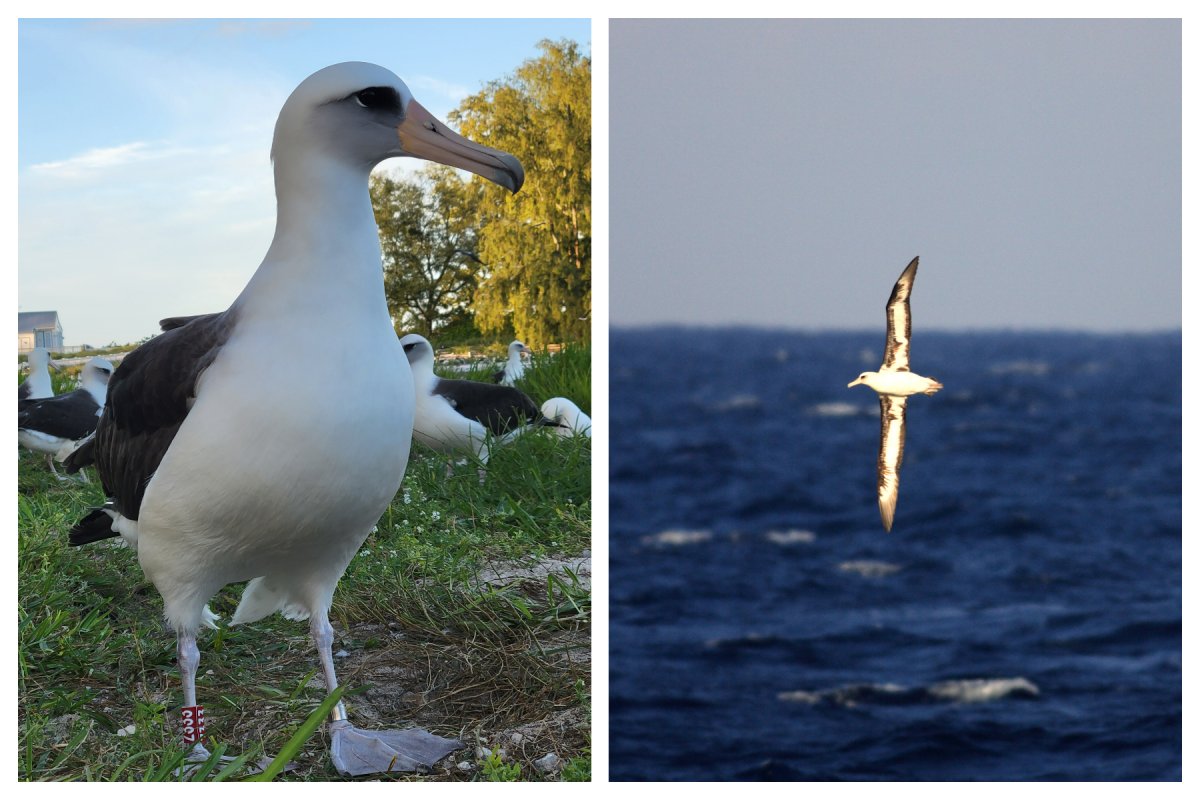The world's oldest known wild bird has returned to her nesting grounds to find her lifelong mate missing for the second year in a row.
The bird, a Laysan albatross named Wisdom, was first spotted in the nesting grounds on Thanksgiving Day this year. Males usually return to the nesting grounds first after spending the rest of the year at sea, but Wisdom has returned to find him absent for the second straight year. He was missing in 2021 as well, leading to fears that he may have died after over 60 years together.
Laysan albatrosses are large seabirds that range across the north Pacific. They spend most of the year at sea, only returning to land long-term to nest, mate and raise their chicks. The majority of the species nest on the northwestern Hawaiian Islands, with 70 percent of the whole population nesting on Midway Atoll each year. The birds can grow to lengths of around 30 inches, but their wingspans can reach up to 80 inches from tip to tip.

Wisdom is a particularly important individual as she is thought to be the oldest living wild bird of any species, being at least 71 years old. She was first banded by scientists in 1956, and had already laid an egg. Laysan albatrosses never lay eggs before the age of 5, leading to this minimum estimate of Wisdom's age, said the U.S. Fish and Wildlife Service (USFWS) in a statement.
"We think Laysan albatrosses live for around 40 years, but it's difficult to know for certain as most birds can't be accurately aged past the juvenile stage, so we rely on ringing records to estimate lifespan. But even accounting for a bit of uncertainty in that, Wisdom is probably exceptionally old and is the oldest known wild bird of any species," Natasha Gillies, a seabird researcher at the University of Liverpool in the U.K., told Newsweek.
The USFWS estimates that Wisdom has produced between 50 and 60 eggs in her lifetime, with as many as 30 chicks successfully fledging and leaving the nest.
Laysan albatrosses usually only mate with a single individual their whole lives. Juvenile birds return to the nesting colony three years after fledging, and spend the next four to five years finding a mate. The young birds will form pair bonds via elaborate courtship rituals and will have their first chicks aged 7 or 8.
The ageless Wisdom, with her well-known band number of Z333, was first spotted this nesting season on Thanksgiving Day.
— USFWS Pacific (@USFWSPacific) December 8, 2022
Her long-time mate has yet to be seen and was absent last nesting season, too. Males typically return to the breeding site first. pic.twitter.com/C0jmpDEld5
On the Hawaiian island Oahu, 31 percent of all mating pairs consist of two females, who hatch and raise chicks from fertilized eggs acquired from other birds.
"Albatrosses are socially monogamous and 'mate for life'—but that doesn't mean they won't re-pair if a partner dies or disappears," Tim Birkhead, a behavioral ecology professor at the University of Sheffield in the U.K., told Newsweek.
This may take a large amount of time, however, due to the complicated nature of forming a bond: the two birds perform a number of ritual dances to each other, involving multiple complex moves.
"Albatrosses do typically mate for life—they 'divorce' occasionally but this the case for only a small fraction of pairs in a given year. They will typically re-mate if one of the partners dies but this can sometimes take years of courtship, so sadly this might mean Wisdom could struggle to find a new mate," Gillies added.
Despite her great age, Wisdom may still have more chicks with a new partner.
Both males and females tend to be less successful at rearing chicks as they get older, however, Gillies said, so the rate of reaching fledging might be lessened in Wisdom's future chicks, if she has any.
Do you have an animal or nature story to share with Newsweek? Do you have a question about albatrosses? Let us know via science@newsweek.com.
Uncommon Knowledge
Newsweek is committed to challenging conventional wisdom and finding connections in the search for common ground.
Newsweek is committed to challenging conventional wisdom and finding connections in the search for common ground.
About the writer
Jess Thomson is a Newsweek Science Reporter based in London UK. Her focus is reporting on science, technology and healthcare. ... Read more
To read how Newsweek uses AI as a newsroom tool, Click here.






